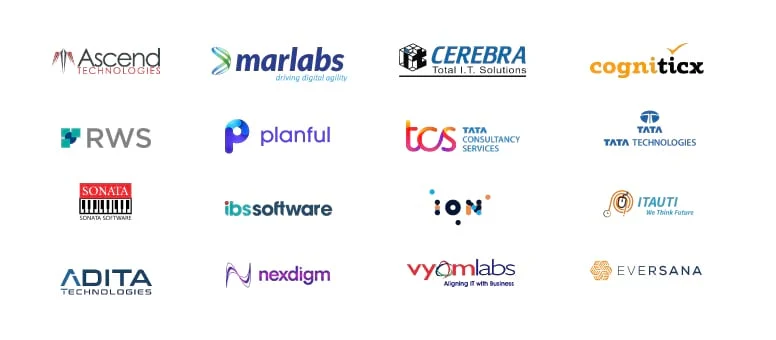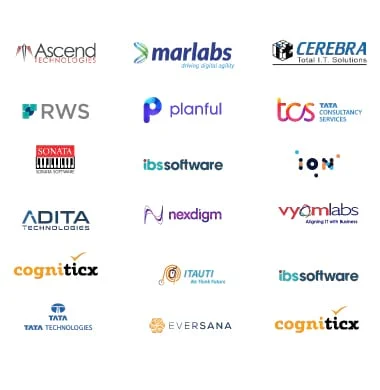30+ Hrs
Hands On Training
Lifetime Access
Updated Content
Customizable
Learning Paths
Industry Expert
Mentors
Projects
Advanced Interactive

Hands On Training
Updated Content
Learning Paths
Mentors
Advanced Interactive
Welcome to our Big Data Hadoop Training! This comprehensive program is designed to equip you with the knowledge and skills necessary to navigate the vast landscape of Big Data and Hadoop technologies.
To apply for the Big Data Hadoop Training, you need to either:
Our Big data Hadoop course content has been designed based on the industry needs. This course content covers end to end concepts to make the aspirants knowledgeable. The following are Big Data Hadoop Syllabus modules that we are going to cover in this module.
Topics:
Learning outcome: Upon the completion of this module, you will gain hands-on experience in Hadoop Installation, shell commands cluster installation, etc.
Topics:
Learning Outcome: Upon the completion of this chapter you will gain knowledge of data replication process, HDFS working mechanism, deciding the size of a block, gain knowledge of data node and name node.
Topics:
Learning Outcome: Upon the completion of this chapter you learn the procedure to write a word count program, knowledge of MapReduce Combiner, writing a custom practitioner, deploying unit tests, how to use a local job runner, what is a tool runner, data set joining etc.
Topics:
Learning outcome: By the completion of this module you will learn the process to create a database in Hive, Hive table creation, Database dropping and customization to a table, Writing Hive queries to pull data, Hive Table Partitioning and Group by clause.
Topics:
Learning Outcome: This chapter will give you complete knowledge of Hive queries, joining table, sequence table deployment, writing indexes, data storage in a different table.
Topics:
Learning outcome: By the completion of this chapter you will gain knowledge to work with Pig, loading of data, storing the data into files, restricting data to 4 rows, working with Filter By, Group By, Split, Distinct, Cross in Hive.
Topics:
Learning Outcome: Upon the completion of this module you will be able to generate sequence numbers, Consume twitter data using Sqoop, Hive table creation with AVRO, Table creation in HBase, AVRO with Pig, Scan and enable table, Deploying disable.
Topics:
Learning Outcome: Upon the completion of this module you will gain knowledge to write Spark applications using Scala, Scala ability for Spark real-time analytics operation.
Topics:
Learning Outcome: Upon the completion of this chapter, you will learn the importance of RDD in Spark and how it makes big data processes faster.
Topics:
Learning Outcome: After finishing this chapter you will gain knowledge to use data frames to query and transform data and get an overview of advantages that arise out of using data frames.
Topics:
Learning Outcome: Upon the completion of this module you will gain hands-on experience in building a recommendation engine.
Topics:
Learning Outcome: Upon the completion of this module, you will gain hands-on exposure in the configuration of Single Node Multi Broker Cluster, Single Node Single Broker Cluster, and integration of Apache Flume and Kafka.
Topics:
Windowed Operators Learning Outcome: After finishing this module you will learn to execute Twitter sentiment analysis, Kafka-Spark Streaming, streaming using Netcat server, and Spark-Flume Streaming.
Topics:
Learning Outcome: By the completion of this chapter you will gain hands-on expertise in building a multi-node Hadoop cluster and working knowledge of cloud managers.
Topics:
Learning Outcome: In this chapter, you will gain hands-on exposure in executing performance tuning in MapReduce.
Topics:
Learning Outcome: Upon the completion of this chapter, you will learn the process to recover the MapReduce File system, Hadoop cluster monitoring, Usage of job scheduler to schedule jobs, Fair Scheduler and process to its configuration, FIFO schedule and MapReduce job submission flow.
We at HKR not only provide you with theoretical training but also make you practically knowledgeable by making you work with real-.....world projects and case studies. Every course we offer includes two real-time projects which provide you with real-time experience. The practical knowledge improves your domain expertise and helps you in clearing the certifications with ease. Read more


This Big Data Hadoop Training has been designed based on the current industry needs and provides the aspirants with all the skills to handle real-world tasks. This course will make you practically knowledgeable by making you work with live projects. You will also gain knowledge to clear the Cloudera CCA175 Big Data certification exam. Get the best Big Data Hadoop online training by joining HKR training.
Following are the areas where you gain full knowledge in this course
Following are the job roles and candidates who get benefited from learning this Big data Hadoop course:
As such there are no mandatory prerequisites to join this Big data Hadoop training but having knowledge of Java, Unix and SQL would be an added advantage for you.
In order to get the Big Data Hadoop module training, first, you need to search for the best training center that delivers sound knowledge in the Big Data Hadoop module. Also, take suggestions or pick ideas from already learned or experienced candidates in the subject. HKR Trainings, with a team of industry experts, are ready to enhance your professional career and help you to get your dream job.
Once you complete the entire course along with real-time projects and assignments, HKR delivers the course completion certification. This certification helps to get a job in any company very quickly.
Our trainers are highly qualified and certified with many years of industry experience and technology background in Big Data Hadoop.
Certification differentiates you from the non-certified peers, and you can demand the best salary in the leading companies.
We, at HKR, provide complete guidance to reach your dream job. But your job will be based on your performance in the interview panel and the recruiter requirements.
Each and every class is recorded so if you missed any class you can review the recordings and clarify any doubts with the trainer in next class.
Yes, we don’t assure 100% placement assistance. We are tied up with some corporate companies so when they have a requirement we send your profiles to them.
Yes, we provide demo before starting any training in which you can clear all your doubts before starting training.
Our trainers are real time experts who are presently working on particular platform on which they are providing training.
You can call our customer care 24/7
Max of the students get satisfied with our training, if you are not then we provide a specialised training in return.
For Assistance Contact:
![]()
![]() +91 9711699759
+91 9711699759
Query